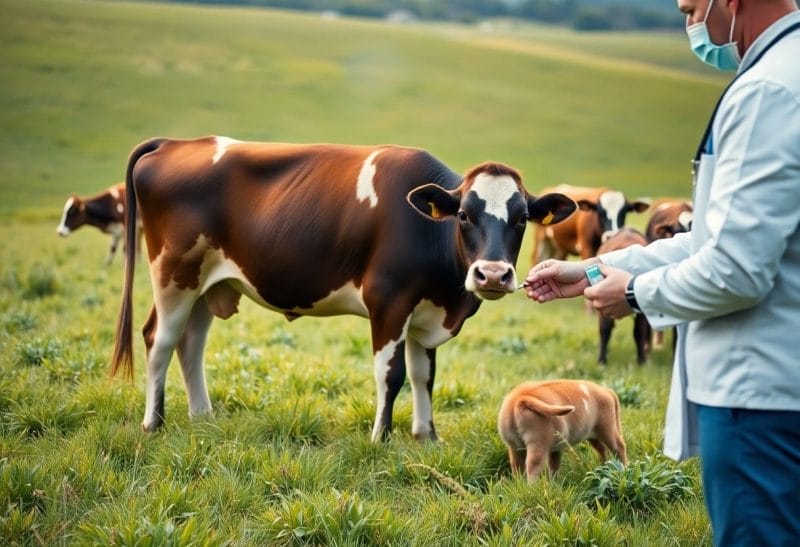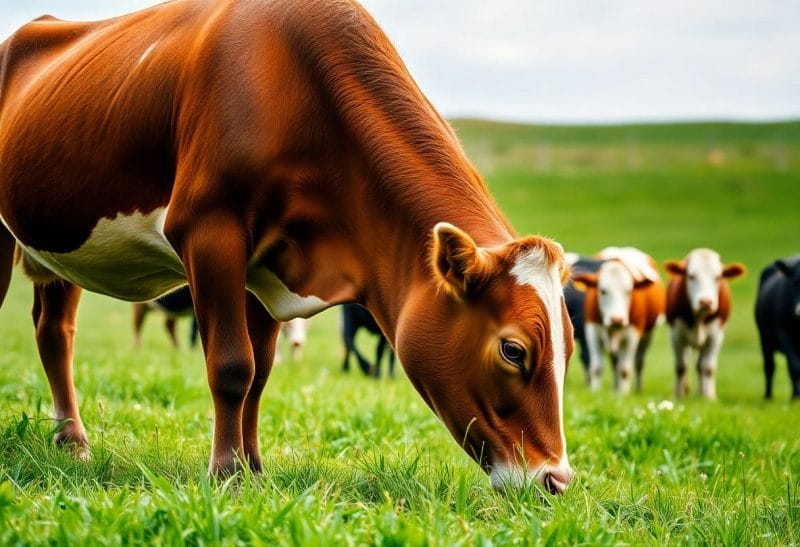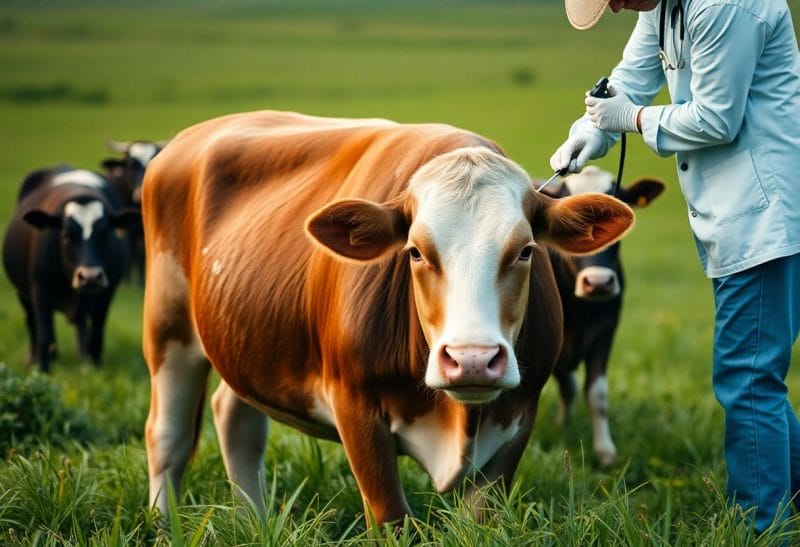Herd health is paramount for any successful livestock operation, and one of the most overlooked aspects is the necessity of deworming your cows. Parasitic infections can lead to decreased production, weight loss, and overall poor health in your herd. By understanding the importance of regular deworming and implementing effective strategies, you can protect your animals from these harmful parasites, ensuring they remain healthy and productive. In this guide, you will learn everything you need to know about cow deworming and how it plays a vital role in maintaining your herd’s well-being.
Key Takeaways:
- Regular Deworming is imperative for maintaining the overall health of your herd by preventing parasitic infections that can lead to decreased productivity.
- Identifying Symptoms early helps you take timely action; keep an eye out for signs such as weight loss, rough coat, and decreased milk production.
- Strategic Treatment Plans tailored to your herd’s specific needs and local environment boost effectiveness and minimize resistance among parasites.
Understanding Cow Deworming
While taking care of your herd, understanding the process and importance of cow deworming is necessary for maintaining optimal health. Deworming helps control parasitic infestations that can significantly affect the overall well-being of your cows. These parasites, which include worms, can lead to stunted growth, decreased milk production, and even mortality if left untreated. By incorporating regular deworming into your herd management practices, you can ensure that your cows remain healthy and productive.
Importance of Deworming
You need to recognize that regular deworming is not just a preventative measure; it is a vital aspect of herd management. It plays a pivotal role in enhancing animal performance and productivity. When your cows are free from parasites, they can thrive, which means better growth rates, improved feed efficiency, and increased milk yield. Moreover, deworming helps reduce the risk of parasite transmission within the herd, safeguarding not only individual animals but also the entire group.
Types of Deworming Medications
To effectively combat parasitic infections, various types of deworming medications are available for your use. Broadly, these can be categorized into two main types: anthelmintics and herbal formulations. Anthelmintics are chemical compounds specifically designed to target and eliminate parasites, while herbal formulations utilize natural ingredients to achieve similar effects. Each type has its unique benefits and drawbacks, and the choice may depend on factors such as the specific parasites present and your management practices.
| Type of Dewormer | Description |
|---|---|
| 1. Benzimidazoles | Target a broad range of gastrointestinal worms. |
| 2. Macrocyclic Lactones | Effective against a variety of internal and external parasites. |
| 3. Imidazothiazoles | Kill adult gastrointestinal worms and some lungworms. |
| 4. Tetrahydropyrimidines | Target nematodes in the gastrointestinal tract. |
| 5. Herbal Dewormers | Utilize botanical ingredients to control parasites. |
With the variety of deworming options available, selecting the appropriate medications for your herd becomes imperative. Each type of dewormer comes with specific instructions, safety information, and withdrawal periods that you should adhere to in order to maximize effectiveness and minimize adverse effects. Additionally, it’s important to rotate the types of dewormers you use to prevent resistance build-up among parasites.
- Consult your veterinarian before starting any deworming program.
- Perform fecal tests to identify specific parasite issues in your herd.
- Follow the recommended dosage carefully for effective treatment.
- Monitor your herd’s health post-deworming to assess efficacy.
- Perceiving these elements can help you maintain a healthy and productive herd.
| Action Item | Importance |
|---|---|
| Regular Fecal Testing | Identifies parasitic infections in your herd. |
| Rotate Dewormers | Prevents the development of resistance. |
| Monitor Pasture Conditions | Aids in reducing worm exposure. |
| Document Deworming Schedules | Enhances management and tracking of treatments. |
| Consult with Experts Regularly | Informs you of the latest practices and products. |
Factors Influencing Deworming Decisions
You need to consider several factors when making decisions about deworming your cattle. Each herd is unique, and understanding these variables can help you optimize your herd’s health. Here are some important factors to keep in mind:
- Age of the cattle
- Weight of the cattle
- Environmental conditions
- Type of dewormer used
- Pasture management practices
After a thorough assessment of these factors, you can make informed choices that align with your herd’s needs and improve overall health outcomes.
Age and Weight of Cattle
Now, one of the primary considerations in deworming decisions hinges on the age and weight of your cattle. Young and growing animals are typically more susceptible to internal parasites, making regular deworming necessary for their growth and development. It’s vital to evaluate the specific life stage of your cattle to determine appropriate deworming intervals, as younger cattle may require more frequent treatment compared to older, mature animals.
Additionally, the weight of your cattle plays a significant role in determining the dosage of deworming medications. Proper calculation based on weight ensures that each animal receives the correct amount to effectively eliminate parasites without risking overdosing or underdosing. Therefore, weigh your cattle accurately to facilitate precise medication dosing that aligns with their health requirements.
Environmental Considerations
To effectively manage your herd’s deworming schedule, environmental factors also come into play. The conditions of your grazing land, such as moisture levels, temperature, and pasture rotation practices, can significantly influence the prevalence of parasitic infections. For instance, wet and humid environmental conditions are conducive to the survival and transmission of certain parasites, while dry periods may reduce their life cycle. Thus, regularly assessing your grazing environment is crucial for timing deworming treatments effectively.
For instance, regions with consistent rainfall may require you to be more vigilant with your deworming strategy due to the higher likelihood of parasite survival and transmission. On the other hand, if you practice good pasture management and rotate grazing areas, you may reduce the parasite load in your herd. Knowing how environmental factors interact with parasite populations enables you to craft a targeted approach to deworming that considers not only your herd’s needs but also the land management practices in place.

Step-by-Step Deworming Process
Not all deworming processes are the same, so it’s important to adopt a systematic approach tailored to your herd’s specific needs. Consider consulting a veterinarian to determine the best deworming schedule and methods for your cattle. Following a proper deworming process ensures that you protect your livestock from various parasitic infestations, which can significantly impact their health and productivity. You can start by familiarizing yourself with the various options available. Don’t Overlook Deworming Dairy Cattle for a more extensive understanding of methods and strategies. Below is a breakdown of the steps involved:
| Step | Description |
| 1. Assess the Situation | Evaluate your herd’s health, age, and previous deworming history. |
| 2. Choose the Right Dewormer | Select a deworming product based on the types of parasites prevalent in your area. |
| 3. Prepare for Deworming | Ensure you have the proper equipment and know the correct dosage. |
| 4. Administer Dewormer | Follow the manufacturer’s instructions for effective application. |
| 5. Monitor and Evaluate | Observe your cattle post-treatment to ensure effectiveness and adjust in future rounds. |
Preparing for Deworming
An effective deworming begins with preparation. Gather all necessary materials, including the dewormer itself, dosing syringes, and any personal protective equipment. Ensure that you understand the appropriate dosage for each animal, as underdosing can lead to ineffective treatment and contribute to parasite resistance. It’s advisable to weigh your cattle beforehand to ensure accuracy in dosing. This preparation helps to maintain a smooth and efficient deworming process.
Administering Dewormer
Little details matter when it comes to administering the dewormer. Make sure to handle the cattle calmly to reduce stress, which can affect how the medication is absorbed. Depending on the type of dewormer—whether it be an oral treatment, injectable, or pour-on—follow the instructions closely. Position the animal appropriately to facilitate a smooth administration, which can sometimes require an assisting partner to hold the animal still.
It is also vital to keep track of which animals have received treatment and when. This record will help you plan future deworming schedules and assess the overall effectiveness of the deworming program. After administering the dewormer, monitor your herd closely for any adverse reactions or signs of improvement, as this information will be helpful for future management decisions.
Tips for Effective Deworming
For effective deworming, it is important to adopt a systematic approach that ensures your herd receives the necessary treatment at the right intervals. Consider these tips to improve your deworming practices:
- Conduct regular fecal egg counts to assess the parasite load.
- Rotate dewormers to reduce the risk of resistance.
- Administer treatments at the suggested dosage tailored for your herd’s needs.
- Isolate and treat new or infected animals promptly.
- Maintain a clean environment to minimize the risk of reinfection.
Any adjustments to your deworming strategy should be based on the health observations of your herd and expert recommendations to ensure long-term effectiveness.
Scheduling and Frequency
Some farmers find it beneficial to establish a deworming schedule based on seasonal parasite cycles. For instance, spring and autumn often represent peak times for certain parasites, making it advisable to perform deworming during these periods. In addition, consistency is key; regular intervals tailored to your herd’s specific needs will enhance the overall effectiveness of your deworming program.
It is important to adjust the frequency based on geographical location, age, and health status of your cattle. You should conduct regular assessments and adapt your schedule accordingly, staying informed about the specific challenges faced by your herd in your region.
Monitoring Herd Health
Tips for monitoring your herd health play a significant role in successful deworming strategies. Keeping a keen eye on any signs of distress or changes in behavior among the cattle is important. Look out for symptoms such as weight loss, poor coat condition, and decreased milk production, as these may indicate a heavier parasite burden. Additionally, regular weight assessments and health checks can help in differentiating between nutritional issues and parasitic infections.
Frequency of health checks can vary, but implementing a consistent schedule—ideally monthly checks—helps you stay proactive about any potential health issues. Consulting with a veterinarian may also provide further insights and tailored recommendations based on your herd’s specific needs, ensuring that you remain vigilant and responsive to their health statuses.

Pros and Cons of Deworming
Many cattle owners weigh the pros and cons of deworming to make informed decisions that will benefit their herds. Understanding both sides of the equation can help you create a well-rounded management plan for your livestock. Below is a breakdown of the advantages and disadvantages associated with cow deworming:
| Pros | Cons |
|---|---|
| Improved overall herd health | Cost of medications and treatments |
| Increased weight gain and productivity | Potential development of drug-resistant parasites |
| Reduction of the risk of severe infestations | Possible adverse reactions to dewormers |
| Prevention of transmission to new animals | Need for regular monitoring and management |
| Enhanced reproductive performance | Environmental concerns regarding chemical treatments |
| Improved feed efficiency | Potential for mistreatment and overuse |
| Long-term economic benefits | Risk of underdosing leading to ineffective treatment |
| Better immune response in animals | Requires knowledge of the specific parasite load |
| Support for optimal herd management practices | Management challenges associated with treatment scheduling |
| Well-being of the animals improved | Time and labor commitment for administration |
Benefits for Herd Health
There’s no denying that effective deworming contributes significantly to your herd’s overall health. By regularly administering dewormers, you help maintain a low parasite load, which in turn promotes better growth rates and reproductive outcomes. Healthy cows are more productive, leading to increased milk production or higher-quality beef. Deworming also reduces the incidence of parasitic diseases, which can otherwise diminish your herd’s vitality and longevity.
In addition to physical health, deworming helps support the immune system of your cows. With fewer parasites competing for nutrients, your livestock can allocate more energy to vital bodily functions, growth, and reproduction. This enhancement not only increases your herd’s productivity but also contributes positively to their overall quality of life.
Potential Risks and Side Effects
Little attention is sometimes given to the potential risks and side effects of deworming, but it is important to be aware of these factors in your herd management strategy. While most dewormers are generally safe and effective, there can be occurrences of adverse reactions in certain animals. These reactions may range from mild symptoms like digestive upset to more severe issues that could require veterinary intervention.
This nuanced approach to cow deworming emphasizes the need for vigilant monitoring after treatment. You should observe your herd closely for any signs of distress following deworming, as well as ensure the appropriate dosing is used to avoid complications such as drug resistance or toxicity. Additionally, overuse or improper application of dewormers can lead to significant ecological impacts, highlighting the necessity of responsible management practices.

Alternative Deworming Strategies
Now that you’ve established a deworming program for your herd, you may be interested in exploring alternative deworming strategies that can complement your current regimen. These alternatives not only enhance the overall effectiveness of deworming but also focus on the health of your cattle and the environment they live in. Many producers are recognizing the importance of sustainable practices, which can include natural remedies and integrated pest management. For more insights, check out this resource on Deworming Dairy Replacement Heifers Is A Balancing Act.
Natural Remedies
Even though conventional deworming medications are often effective, some ranchers are turning to natural remedies as a supplementary approach. These remedies can include herbal treatments such as garlic, neem, and diatomaceous earth, which are believed to have antiparasitic properties. Incorporating these natural products into your herd management practice can promote overall animal wellness and reduce your reliance on chemical dewormers. However, it is crucial to conduct thorough research and consult with a veterinarian to ensure these alternatives align with your herd’s needs.
Integrated Pest Management
Little do many producers realize that integrated pest management (IPM) can play a significant role in controlling internal and external parasites in your cattle. This holistic approach involves monitoring parasite populations, using cultural practices to disrupt their life cycles, and implementing biological controls alongside traditional deworming. You can reduce the need for routine chemical applications by adopting preventive measures such as pasture rotation, proper sanitation, and regular health assessments of your herd.
With IPM, you don’t only focus on treating the symptoms but work towards a comprehensive management plan that reduces the incidence of parasitic infestations. Monitoring your herd, pastures, and general environment can help you identify potential issues before they escalate. By combining different strategies—whether conventional or alternative—you can create a robust, integrated approach that safeguards your cattle’s health for the long term.
Conclusion
On the whole, maintaining the health of your herd through effective cow deworming practices is imperative for ensuring optimal productivity and longevity in your cattle. You must recognize the significant impact that parasitic infections can have on your cows, leading to reduced weight gain, decreased milk production, and overall compromised health. By implementing a comprehensive deworming program tailored to your specific management practices, you empower yourself to protect your investment and promote the well-being of your animals.
Moreover, staying informed about the life cycles of common parasites and the appropriate deworming schedules is key to your herd’s success. You should also actively collaborate with veterinary professionals and utilize laboratory analyses when necessary, ensuring that your deworming strategies are effective and aligned with the latest research. By prioritizing a thorough deworming approach and continuously educating yourself about best practices, you can contribute to a healthier herd and, ultimately, a more prosperous farming operation.
FAQ
Q: Why is deworming important for cattle?
A: Deworming is vital for maintaining the health of cattle. Parasites can lead to various health issues such as weight loss, decreased milk production, and weakened immune systems. Regular deworming helps ensure that cattle can absorb nutrients effectively, thereby promoting overall body condition and productivity.
Q: How often should I deworm my cattle?
A: The frequency of deworming can vary depending on several factors, including the type of parasites prevalent in your area and the specific needs of your herd. Generally, it is recommended to deworm cattle at least twice a year, although some operations may require more frequent treatments based on veterinarian advice and fecal examinations.
Q: What are the signs that my cattle may need deworming?
A: Signs that cattle may require deworming include poor body condition, weight loss, anemia, diarrhea, or a decrease in milk production. Additionally, if you notice excessive scratching or rubbing against objects, it may indicate a parasitic infestation. Regular health assessments can help identify these symptoms early on.
Q: Which deworming products are most effective for cattle?
A: Various deworming products are available, including injectable dewormers, oral pastes, and feed additives. The choice of product may depend on the specific parasites identified and the life cycle stages you are targeting. It is advisable to consult with a veterinarian to determine the most effective treatment plan for your herd, as resistance to certain dewormers can occur.
Q: Are there any risks associated with deworming cattle?
A: While deworming is generally safe, there are potential risks, such as the possibility of adverse reactions to certain deworming agents. Additionally, overuse or improper use of dewormers can lead to resistance, making treatments less effective over time. Following recommended dosages and consulting with a veterinarian can help mitigate these risks and ensure the health of your herd.










